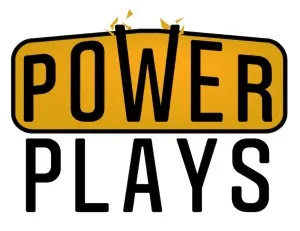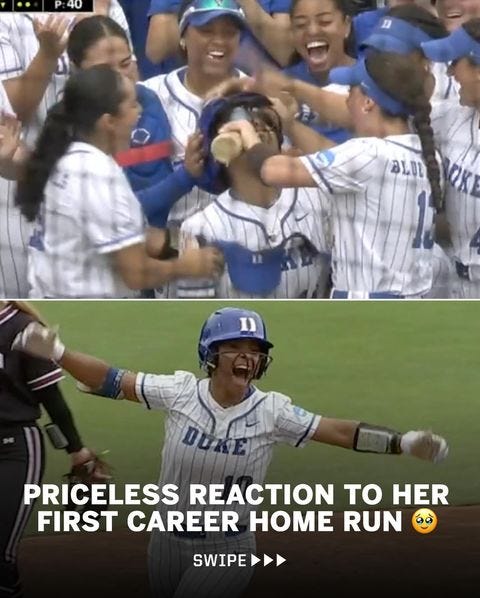Duke softball is one of Title IX's greatest modern success stories
The Women's College World Series is here. And so are the Blue Devils.
Hi, friends. We’re well into what is one of the most fun postseasons in sports — the NCAA DI women’s softball tournament, of course. Last weekend was the Super Regionals, and I was absolutely glued to my television. Five of the series (Tennessee/Alabama, Texas/Texas A&M, Florida/Baylor, and Duke/Missouri, and LSU/Stanford) went to a deciding third game, and almost all were nail-biters until the end.
The Women’s College World Series begins today in Oklahoma City, Oklahoma. This year’s elite eight are No. 1 Texas, No. 2 Oklahoma, No. 4 Florida, No. 5 Oklahoma State, No. 6 UCLA, No. 8 Stanford, No. 10 Duke, and No. 14 Alabama. The world series begins with a double-elimination format, meaning if you lose twice, you’re out. That will eliminate six teams. The final two teams will play a best-of-three series for the championship. (It’s truly the best playoff format ever.)
The eight teams competing this week have a combined 110 appearances in the WCWS — UCLA has 35, Oklahoma has 21, Oklahoma State has 16, Alabama has 15, Florida has 12, Texas has seven, and Stanford has four.
I want to talk about the new kid on the block: Duke.1
When a program reaches a new milestone, it’s customary to say that it’s been a long road to get there. In Duke’s case, that road hasn’t been as long as you might think; the Duke softball program is only seven years old.
But its existence is evidence of the power of Title IX, not just in revolutionizing women’s sports in 1972, when the law was enacted, but in providing an ongoing mechanism of accountability that keeps pressuring athletic departments across the country to push women’s sports forward. And in that sense, this WCWS debut is a long time coming.
Back in 1997, which was the 25th anniversary of Title IX, Duke was one of 25 institutions flagged in a complaint to the Office of Civil Rights by the National Women’s Law Center for noncompliance. At the time, Duke reached a deal with the OCR to continue to build its women’s rowing program and implement more scholarships for women’s sports it already sponsored. But over the next decade, gender inequities in the Duke athletic department intensified as its investment in men’s programs kept increasing, while investment in women’s sports stagnated. In 2011, Duke was one of many schools called out in a New York Times investigation for exploiting Title IX loopholes, such as counting male practice players in women’s basketball as women athletes.
To its credit, the Duke administration wanted to get back on track with Title IX compliance.2 And, after carefully considering all of its options, the path forward was clear.
In 2013, then-athletic director Kevin White announced that Duke was launching its 27th varsity sport, softball, and increasing scholarships for women’s fencing, rowing, swimming and diving, and track & field, so that each program was receiving the maximum number of scholarships allotted by the NCAA.
“Duke University is fully committed to providing the most complete educational and athletic opportunities for women,” White said in the press release.
And just like that, 45 years after the Association of Intercollegiate Athletics for Women (AIAW) first held a collegiate women’s softball championship, 41 years after Title IX was enacted into law, and 31 years after the NCAA hosted its first Women’s College World Series, a new softball program was born.
In 2015, White hired Marissa Young, an assistant at North Carolina and former Big Ten Player of the Year at Michigan, as the program’s first head coach. There was no softball stadium. There was no practice facility. There was no staff. There were no uniforms. And there certainly weren’t any players. But, with the first fastpitch scheduled for the 2018 season, Young got to work.
The ensuing years have been well documented by others, including Duke Magazine, the Athletic, Duke Chronicle, the NCAA website, and the Wall Street Journal, among others. There’s even a mini documentary you can watch, if that’s your jam.
But to summarize, Young sold her vision to a group of players, most notably pitcher Peyton St. George, who relished the opportunity to be Player One and help build a program from scratch.
“I wish I had a stadium to show you. I wish I had a locker room to show you. I have nothing to show you. But I need you to trust me to know that I want to build this program around you and we're gonna go some really far places,” St. George, who became an All-American at Duke, recalled Young telling her, as reported by the Chronicle.
The first two seasons, Duke hovered around .500. But in 2020, before the pandemic shut down the season, they were 23-4. In 2021, the Blue Devils made the NCAA tournament for the first time as the No. 13 seed, though they didn’t get to host a regional due to pandemic restrictions. In 2022, they finished second in the ACC, earned the No. 12 seed in the tournament, got to host a regional, and made it to the Super Regionals before falling to UCLA. In 2023, they finished second in the ACC again, earned the No. 8 seed, got to host a regional and Super Regional, but fell to No. 9 Stanford in the Super Regionals.
Each year they’ve taken a step forward. This season, obviously, is no different.
Today they will face Oklahoma, winners of the last three championships, at the USA Hall of Fame Stadium in Oklahoma City, Oklahoma at 2:30pm ET on ESPN. Young has officially led this group — Team Seven, as she calls them — to the biggest stage in the sport. I don’t expect the Blue Devils to be overwhelmed by the occasion.
This team is something special. They’re a confident and diverse group, led by a Black female coach in a predominantly-white sport, and they relish the opportunity to provide the representation they didn’t have growing up. (Edited to add: Per Rhiannon Potkey, Young is the first Black head coach in WCWS history!!)
On the field, they’re building quite the resume. Duke is 52-7 on the season, and 5-1 in extra-inning games. They won won the ACC regular season and tournament championships, and despite getting a surprising No. 10 seed that prevented them from hosting the Super Regionals, managed to take down No. 7 Missouri in three games. Three of their players were named All Americans this week: Claire Davidson, Jala Wright, and Aminah Vega. The tenser the situation gets, the better Duke performs — in the 2024 NCAA tournament, Duke has scored 12 runs in the first four innings, and 35 runs in innings 5-10.
Its understandable why they thrives under pressure; this team has seen first-hand what adversity looks like in the real world. Last year during the NCAA tournament, Young’s husband, James Lamar, had a heart attack and landed on life support for three weeks. He ended up getting a kidney and heart transplant. His recovery has been painstakingly slow; he’s still in a wheelchair and has surgeries every other week, in hopes that he will be able to walk again next year. Jadyn Watson-Fisher of the News & Observer did an in-depth feature on his illness, recovery, and the perseverance Young has shown through it all, and it’s a must-read.
Somehow, Young has managed to thrive as both a caretaker and coach, and Lamar remains involved with the team from afar, texting them after games; the stakes are different, but the journeys to save and rebuild Lamar’s life and health, and to take Duke to the WCWS, are inextricably linked.
Two weeks ago, I went to Durham to watch Duke host the regionals, where they took down Murray State, Utah, and South Carolina to advance to the Supers. I was impressed by the whole team — especially Wright, the ACC Pitcher of the Year, and sophomore D’Auna Jennings, who has hit the first two home runs of her collegiate career this postseason. Everything, except the rainy weather, was picture perfect, from the facilities to the boisterous crowd to the contagious camaraderie on display in Duke dugout. As Duke’s offense came alive late in the regional final against South Carolina, and the Blue Devils started pouring in runs on the way to a 10-1 victory, I was in awe at how many young women were absolutely thriving in this moment, with this coach, on this field, in front of these fans. And how this moment would not be possible without the reporters, advocates, lawyers, students, alumni, and staff who keep putting pressure on administrations to adhere to Title IX, year after year, decade after decade.
After the game, freshman Amiah Burgess, whose bases-clearing triple put an exclamation point on Duke’s eight-run seventh inning that Sunday afternoon, said when she got to the plate she thought, “I've got to get as much as I can because we need these runs to really make a statement.”
What statement was that?
“That we came to play,” Burgess said. “That Duke is here, whether the NCAA likes it or not, whether the other teams like it or not, we're here and we're ready to beat you.”
Obligatory: Go Tar Heels!!!
Actual enforcement mechanisms for Title IX compliance leave quite a lot to be desired.








